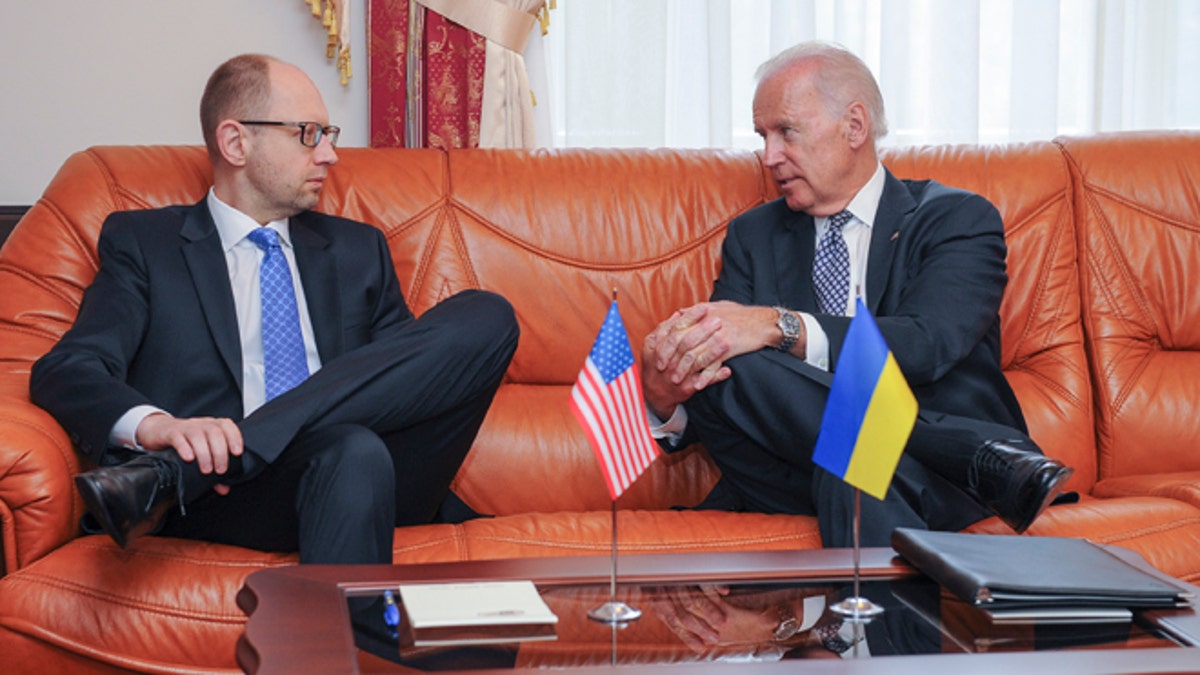
April. 22, 2014: Vice President Joe Biden, right, talks with Ukrainian Prime Minister Arseniy Yatsenyuk during a meeting in Kiev, Ukraine. (AP)
As Vice President Biden ponders a 2016 presidential run, he continues to use the benefits of his office to make high-profile trips to Ukraine and other diplomatic hotspots -- burnishing the foreign policy credentials he would need to win the Democratic nomination over Hillary Clinton.
Biden already has solid credentials, having served on the Senate Foreign Relations Committee as either chairman or ranking member for about 10 years, from roughly 1997 to 2007.
However, should Biden decide to run, he would face a big challenge in convincing Americans that he would be a better choice than Clinton in responding to an international crisis.
In the 2008 presidential races, Clinton, as a former first lady, touted her knowledge of world leaders and the U.S. military with a TV ad that helped her win the Texas Democratic primary in March.
“It’s 3 a.m. and you’re children are safe and asleep,” the ad’s narrator says. “But there’s a phone in the White House and its ringing. Your vote will decide who answers that call.”
Eight years later, Clinton, the Democrats’ presumptive 2016 frontrunner, brings to the debate five years of experience as Secretary of State.
Still, foreign policy is rarely the major issue that decides a presidential election, with voters also focused on so-called “pocketbook issues” like jobs and the economy.
“Voters want to have a sense of security, a level of confidence that the candidate can handle international affairs,” says Ben Tulchin, a Democratic pollster and president of San Francisco-based Tulchin Research.
“They need somebody with a lot of experience and bona fides,” he told FoxNews.com. “And a vice president meets that threshold.”
Biden returned this week from a 2-day trip to Ukraine where he pledged the United States’ support for that county’s beleaguered, temporary government and criticized Russia’s foray into that country.
“It's time to stop talking and start acting," said Biden, telling Moscow to ease tensions in Ukraine by encouraging pro-Russia separatists there to vacate government buildings and checkpoints, weeks after Russian President Vladimir Putin, with help from military forces, annexed Ukraine’s Crimean peninsula.
The White House wouldn’t say whether Biden asked to make the trip or was dispatched.
“Mr. Biden's trip came about through a conversation between the president and vice president,” a White House adviser told reporters Monday. “But it's hard to say whether Mr. Biden asked to go or Mr. Obama suggested he go. They wanted a high-ranking U.S. official to visit and thought Mr. Biden's diplomatic experience in dealing with Ukraine made him the right choice.”
Biden’s diplomatic reach goes well beyond Ukraine and includes relationships with Israeli President Benjamin Netanyahu, whom Biden said he met more than four decades ago, and China’s President Xi Jinping, whom he first met in 2011 during an overseas trip.




